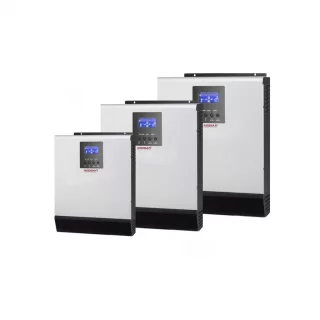Inverters Modern Energy Conversion with Solar Power
Inverter : Solar energy is gaining more and more popularity in the modern world and interest in the clean and limitless energy of the sun to meet our energy needs is growing. In this context, inverters are critical technologies for converting solar energy into usable electrical energy.
What is an Inverter?
An inverter is a device that converts direct current (DC) electricity generated by solar panels into alternating current (AC) that can be used in homes or businesses. The DC electricity generated by solar panel arrays is harmonized with AC-powered devices such as household appliances and industrial equipment.






How does it work?
Collection of DC Electricity: Solar panels convert sunlight directly into electrical energy and generate DC electricity.
Inverter Conversion: The inverter takes the incoming DC electricity and converts it into AC electricity through the electronic circuits inside.
Using AC Electricity: The generated AC electricity is connected to a building's electrical system or to the power grid, making it available for use by household appliances, lighting systems and other electrical devices.
Inverter Types
Centralized Inverters: Used in large-scale solar systems, this type of inverter collects the DC electricity generated by many solar panels and converts it into AC electricity through a single large inverter.
Array Inverters: Used for small-scale systems or home solar installations, these inverters are located below each solar panel array and convert the DC output of each panel to AC.
Micro Inverters: Mounted on each solar panel, these inverters immediately convert the DC electricity from each panel to AC, increasing efficiency and allowing monitoring of the panel's performance.
Advantages
- Clean Energy Production: Provides environmentally friendly and sustainable electricity generation using solar energy.
- Low Maintenance Costs: Inverters are generally low maintenance and have a long lifetime.
- Energy Independence: Solar and inverters increase energy independence by reducing dependence on the electricity grid.
Inverters have an important role to play in expanding the use of solar energy and accelerating the transition to sustainable energy. These technologies are an important step towards providing cleaner and greener energy in the future.
Areas of Use of Inverters
Power Supply: Inverters are used to convert DC power to AC where AC power supply is not available, especially for portable electronic devices. This is commonly done to enable the use of electronic devices during camping, RV trips or traveling.
Renewable Energy Systems: Renewable energy sources such as solar panels or wind turbines generate DC electricity. However, homes and businesses often use AC electricity. Inverters are used to convert this direct current into AC electricity that can be used in homes or businesses.
UPS (Uninterruptible Power Supply) Systems: Uninterruptible power supply systems are used to provide continuous power during AC power outages. In these systems, a battery provides DC power and an inverter converts this DC power to AC, allowing connected devices to operate.
Electric Vehicle Charging Stations: Electric vehicles run on DC electricity, but many charging stations provide AC power. Inverters are used at charging stations to convert AC power to DC, allowing electric vehicles to be charged.

